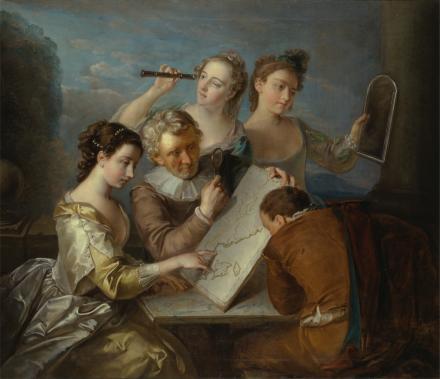Sociable objects in Britain and Europe (1650-1850)
Université de Lille, 23rd November 2023
One-day conference organized by Vanessa Alayrac-Fielding & Pierre Labrune (Université de Lille)
This one-day conference aims at continuing the work done by the “GIS Sociability” – a group of researchers studying European sociabilities in the long eighteenth century – and at exploring perspectives opened by the renewal of the field of material culture studies. It will focus on the role played by objects – whether they be as small as snuffboxes or as large as carriages – in the development of new forms of sociability in an age when Britain became a leading commercial power and when the two meanings of the word “commerce” – relating both to business and to social interactions – were often associated.
Considering “objects […] in the abstract and sensible networks that are essential to understand social facts” (Roche, 1997, 10) allows one to perceive the ambivalences of the long eighteenth century, in which discourses in praise of universal sociability cohabited with a growing commodification of the world. Increasing global exchanges and the construction of European empires led to the arrival and discovery of colonial and extra-European objects in Europe and Britain, made with natural materials or with animal products (feathers, tortoiseshell, wood, minerals, kaolin etc), which fostered new social interactions, such as the practice of collecting and displaying one’s collection (Gerritsen and Riello 2015 ; Avery, Calaresu and Laven 2015), and shaped the tastes of consumers eager to show their curiosity for new things and/or materials and their social status through conspicuous material consumption. As Addison wrote in an essay describing the Royal Exchange in The Spectator: “The single Dress of a Woman of Quality is often the Product of a hundred Climates.” In the Republic of Letters, books, to be considered here as objects and in relation to their materiality, allowed for the creation of intellectual networks and the development of sociabilities built upon bibliophilic exchanges. Objects, alongside narratives, participated in the creation of the “sensible public sphere” (Lilti, 2019, 189) that characterized the eighteenth century. In this context, it seems particularly relevant to pay attention to the agency of objects, their ability to shape and transform the private and public spheres and take part in social interactions.
That is why the transformations of the very fabrication processes of different objects should be better analysed, as it was in that time that a consumer society was born, especially in England (McKendrick, Brewer and Plumb, 1982). To study the role of objects in sociabilities, one should not disregard the tensions between, on the one hand, the budding mass producing of certain objects, and, on the other hand, the importance of unique productions showing great craftsmanship that were means to affirm one’s taste and distinction.
Bibliography:
Addison, Joseph, and Steele Richard, The Spectator, ed. Donald F. Bond, Oxford: Clarendon Press, 1965, 5 vol.
Appadurai, Arjun, (ed.), The Social Life of Things: Commodities in Cultural Perspective, Cambridge: Cambridge University Press, 1986.
Avery, Victoria, Calaresu, Melissa, and Laven, Mary, (eds.), Treasured Possessions: from Renaissance to Enlightenment, London; Philip Wilson Publishers, 2015.
Brewer, John, and Porter, Roy, (eds.), Consumption and the World of Goods, London: Routledge, 1993.
Downes, Stephanie, Holloway Sally and Randle Sarah (eds.), Feeling Things: Objects and Emotions through History, Oxford: Oxford University Press, 2018.
Festa, Lynn, Fiction without Humanity. Person, Animal, Thing in Early Enlightenment Literature and Culture. Philadelphia: University of Pennsylvania Press, 2019.
Findlen, Paula (ed.), Early Modern Things: Objects and their Histories, 1500-1800, New York: Routledge, 2013.
Gerritsen, Anne, and Riello, Giorgio, (eds.), The Global Lives of Things: The Material Culture of Connections in the Early Modern World, London: Routledge, 2015.
Lilti, Antoine, L’Héritage des Lumières. Ambivalences de la modernité. Paris : EHESS, Gallimard, Seuil, 2019.
McKendrick, Neil, Brewer, John, and Plumb, J. H., The Birth of a Consumer Society: The Commercialization of 18th-Century England, Bloomington: Indiana University Press, 1982.
Roche, Daniel, Histoire des choses banales. Naissance de la consommation dans les sociétés traditionnelles (xviie-xixe siècles), Paris : Fayard, 1997.

Other news
One-Day Conference: Les voyageurs européens et les lointains, perception(s), confrontation(s), représentation(s). 1600-1840
One-Day Conference Les voyageurs européens et les lointains, perception(s), confrontation(s), représentation(s). 1600-1840 14 June 2024 BnF, Site Richelieu, salle des conférences ...
CFP: Consentir, Refuser, Céder : Spectres de la Conquête à la Restauration (1660-1714)
Appel à contributions: Consentir, Refuser, Céder : Spectres de la Conquête à la Restauration (1660-1714) Colloque co-organisé IRCL (Université Paul-Valéry Montpellier 3) - LARCA (Université Paris C...
GIS Cycle of talks - "Les objets de luxe au XVIIIe siècle : diffusion d’une culture de consommation"
Thursday May 23, 2024 (6:00-7:15 pm) Natacha Coquery (Université Lumière Lyon 2) : "Les objets de luxe au XVIIIe siècle : diffusion d’une culture de consommation" Abstract : Pour comprendre le l...